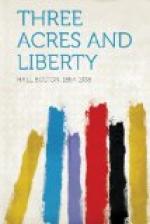Besides this, a ten-dollar lot, if restricted for residence or available for business, often advances to $100 in a year; one good house which some one else built near it may raise its value that much.
If the land is high priced, see that there is some kind of a building on it; even a shanty will usually bring in enough or save you enough by its use to pay the taxes; so you will have that working for you whilst you are away.
If possible, buy at auction and of reputable people who are not boomers, or at least buy at forced sale; that is how real estate is sold when it must be sold. Choose lots level with the curb and on high ground, lest the expense of grading and sewering eat up your profit.
Keep in mind that in buying land for speculation one really buys the opportunity to tax other people, by taking part of their earnings in the shape of rent or price. Do not then be deluded by boom schemes in inaccessible or desolate places; choose rather that land which in the natural course of events others must have in order to work or to live.
Home buying in small communities is safer than in the outskirts of a large city, because public improvements are much less costly. If you put $500 in a $5000 home and carry the balance on mortgage, an assessment of $1000 for streets or sewers, which helps the vacant lots, will probably put you out of business. Whether for use or speculation, buy in an established neighborhood or where the circumstances and neighbors are such that restrictions or expenditures will make its character sure. The increase in your land value depends first upon the presence, then upon the efforts, of others; it is by their labor you hope to profit.
Therefore, buy property on leading thoroughfares; except in a very small section devoted to the residence of millionaires, the price of residence property has a limit; even there the merest accident or the whim of fashion may destroy the value, but there is no telling what figure business property may reach.
Do not build unless you have to. It is rare that a building pays five per cent net on the value of the land and the cost of the house. “Who buys a house already wrought, gets many a brick and nail for naught.” If, however, you can get a piece of ground in a growing neighborhood and live on it till you can sell at an advance, that is the safest, and surest of investments. It delivers you from the power of the landlord.
Lastly—in real estate—don’t bite off more than you can chew.
Most of these rules apply to the purchase of suburban land. In farm buying, keep as close to your market as you can. See that railway facilities are all right; get land likely to be needed for other purposes. The best way to begin is by securing all information possible from state agricultural departments. Write to the industrial agents of important railroads traversing the section in which you want to locate. They have detailed information regarding land, markets, social conditions, etc.; get from the United States Agricultural Department a map showing the soil survey of the section of your choice. It must be borne in mind that personal aid is not to be expected from State Agricultural Departments, Bureaus of Immigration, railway companies, or any public agency.




